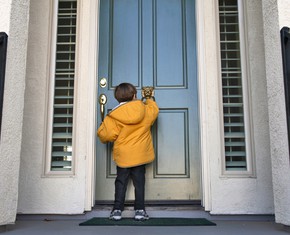The views expressed in our content reflect individual perspectives and do not represent the authoritative views of the Baha'i Faith.
What makes a “beloved community?” Originally a concept from the American philosopher Josiah Royce, the phrase was adopted by the Reverend Dr. Martin Luther King, Jr., who wrote that achieving beloved community is not about defeating opponents but winning their friendship.
Dr. King said economic and social justice, fueled by brotherly love, build the pillars of a beloved community.
Do you consider yourself part of a beloved community?
RELATED: Do You Have to Be a Baha’i to Be Part of the Baha’i Community?
How Baha’is Create Beloved Community
In order to describe how a Baha’i would strive to create beloved community, it’s necessary to explain a little about organization in the Baha’i Faith.
Baha’u’llah, the revealer of the Baha’i message, taught that all things derive from one point – God’s will – so all things are imbued with spirit. He advised that diversities of nationality, gender, ethnicity, race, and thought were provided by God. He proclaimed that humankind comprises one family whose members are united in spirit, and that religions are part of a single progressively unfolding Faith.
Indeed, Baha’u’llah declared that if two people argue about religion, both are wrong. His social teachings include that all people must become educated; extremes of wealth and poverty must be eliminated by applying spiritual solutions; peace among the races and nations must be achieved; the equality of men and women must be upheld; and a universal auxiliary language must be established. He also declared that because religion and science are two different ways to understand reality, both avenues should be used and both essentially agree.
The Unique Structure of a Baha’i Community
Baha’u’llah didn’t just promulgate a set of principles, however – he established an administrative order through which the spirit of his teachings can flow. Baha’i communities are organized without clergy and are overseen by elected bodies, called Assemblies, of nine individuals in each locality anywhere in the world where at least nine adult Baha’is reside. Any adult Baha’i within the jurisdiction is eligible to serve on an Assembly. Elections occur without electioneering or nominations, and happen similarly for the national as well as for the international Baha’i governing body.
Communities gather on the first day of each 19-day Baha’i month to pray, consult and socialize. Issues of community concern are decided by consensus during a process of consultation, whose aim is to uncover the truth in any situation. In this age of the maturation of humanity, Baha’u’llah advised us to individually determine relative truths especially through prayer, meditation and studying the Baha’i writings. Baha’u’llah wrote:
We love to see you at all times consorting in amity and concord within the paradise of My good-pleasure, and to inhale from your acts the fragrance of friendliness and unity, of loving-kindness and fellowship. Thus counselleth you the All-Knowing, the Faithful. We shall always be with you; if We inhale the perfume of your fellowship, Our heart will assuredly rejoice, for naught else can satisfy Us.
How Beloved Communities Interact and Consult
The consultative Baha’i decision process generally begins with prayer, with the goal of identifying the higher spiritual principles involved in any issue. Successful consultation requires elimination of all prejudice and quelling of individual egos. All expressed ideas immediately belong to the group, not to any individual. One hundred percent consensus is the goal. Once a decision is reached, all must support and attempt to carry it out. Baha’u’llah advised the Baha’is to: “Cleave unto that which draweth you together and uniteth you. This, verily, is the most exalted Word which the Mother Book hath sent down and revealed unto you.”
Every 19 days the Baha’i community meets together. These gatherings, called Feasts, give the entire community the opportunity to consult together. Everyone has an equal voice and all voices can be heard. Assemblies deliberate on the resulting suggestions from the community and create ways for them to become realized. As individuals, Baha’is recite a daily obligatory prayer and participate in an annual 19-day fast, study the Baha’i writings, and refer to Baha’u’llah’s teachings to uncover the spiritual principles defining any situation. In these ways, Baha’is around the world engage individually as well as collectively to find spiritual solutions to material problems.
RELATED: How to Worship with Your Community: the Baha’i Feast
Within this framework, Baha’is assess their own individual and collective realities to find ways to resolve internal issues. They also work externally with those in the larger community to address the challenges facing humankind, with the goal of building an ever-advancing civilization – a global beloved community – as Baha’u’llah advised everyone:
All men have been created to carry forward an ever-advancing civilization. The Almighty beareth Me witness: To act like the beasts of the field is unworthy of man. Those virtues that befit his dignity are forbearance, mercy, compassion and loving-kindness towards all the peoples and kindreds of the earth.
Of course, the strength of the Baha’i framework depends entirely on individuals’ efforts to embody spiritual teachings and their sensitivity to local issues. Surely this has always been and will be the case in all faiths. To build a beloved community requires first the love, and then the community.
[Note: This BahaiTeachings.org article is adapted from a guest essay published in Connections, a publication of the Episcopal Diocese of Southwestern Ohio, which called for members of other religions to write guest essays about how their Faiths reflect Rev. Dr. Martin Luther King’s vision of a beloved community.
A few weeks after the original article was published, I received an appreciative hand-written personal note from one of our state’s U.S. Senators, saying how inspiring he found the essay. This Senator has been deeply involved in politics for many decades, so it’s safe to say that he knows the limitations of an intellectual approach to problem-solving, and can appreciate the elegance of the Baha’i administrative order.]
















Comments
Sign in or create an account
Continue with Googleor